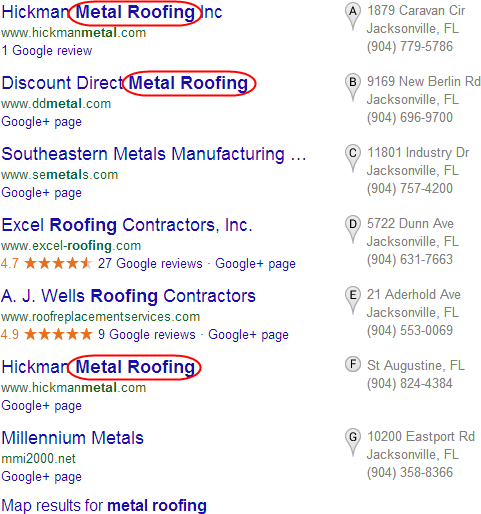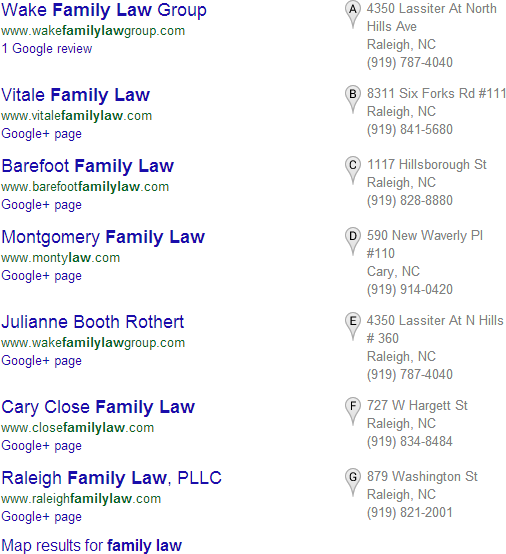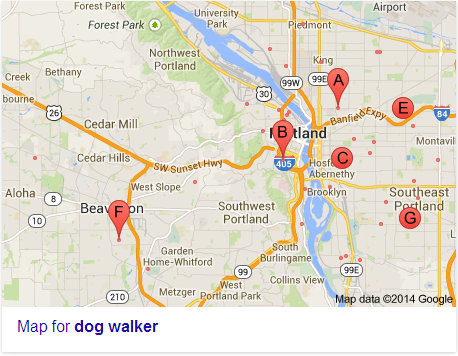If you’re opening a new business or considering some changes, can you make your business itself local-search-friendly?
Can you bless yourself with an inherent advantage in the local rankings – like super local SEO genes?
Yes ma’am.
It’s like with athletes. Of course, hard work separates them from each other and from couch potatoes. But if you’re a swimmer, wouldn’t it help at least a little if you’re like Michael Phelps and have flipper-feet, and arms longer than your legs?
Genes only get you so far. But every bit counts in a competitive world. If possible, you want to make the inevitable hard work easier, and you want everyone else have to work a little harder.
You’ll only find this post useful if you’re starting your business, opening a new location, or considering making major changes.
I’m going to throw out a bunch of suggestions for how you might make your business inherently more local-SEO’d. Some of them you may have considered before.
I’m not saying all these ideas are applicable to you. It’s more likely that only a couple of them are realistic in your case. Just see what you can apply to your situation.
Relevance genes
Suggestion 1. Position yourself as a specialist – or focus your whole company on a niche.
If you’re a roofer and you focus on metal-roofing jobs it’ll probably be easier to rank for “metal roofing” than for “roofing” and “roofers.” The same is true if you’re a dentist who mostly wants to do more implants, or a mechanic who wants more transmission work.

Specializing doesn’t necessarily mean you offer fewer services. Steakhouses serve more than steak. It’s a marketing decision, more than anything else.
Less competition often makes it easier to rank well. Your local visibility might also open more wallets, because you’re catering to a specific group of people and not trying to be all things to all people.
The traffic is likely to be of higher quality. The more specific the search term, the more likely it is the searcher has moved beyond tire-kicking and know what he/she wants.
Also, you’re in a better position to use a descriptor on your Google Places page.
Suggestion 2. Name your business with a relevant keyword or two. Like “Acme Windows & Gutters” or “Smith Accounting & Bookkeeping.”

Do it for real: make it official with the State.
Speaking of state, consider using a state name in your name, like “Acme Windows & Gutters of Maryland.”
A couple nice upshots of picking out a strategic business name are:
(1) brand-name links to your site will include relevant anchor text, and
(2) customers’ reviews are more likely to mention relevant keywords, just because there’s a good chance they’ll mention your name.
Suggestion 3. Include your 1-2 main service(s) in the name of your site.
Think hard about whether to include the name of your city. Unless you plan to focus on one city and don’t really want customers from elsewhere, don’t pick a city-specific website name. You don’t want to force yourself into using multiple websites.
Suggestion 4. Hire someone who speaks a language that many of your customers speak, or that’s widely spoken in your city or neighborhood. For starters, that will allow you to create multilingual pages on your site, where you describe your services in that language. That will help you rank for those services.
Location genes
Suggestion 5. Get an address in a populous city, if that’s where you’re trying to rank. (Gee, Phil, I didn’t see that one coming…)
Must your business be in the big city if you want to rank there? Maybe not. It depends on several factors, chief of which is how much competition you’ve got.
I have no idea how practical it is for you to move your operations, but that’s not the point. We’re simply talking about whether a big-city address is a ranking advantage in the big city. It is, especially since Google’s Pigeon update.
Don’t forget that in some ways the bar is lower. Even if you only rank well in Google Places in a ZIP code or two, you might reach all the customers you need.
Suggestion 6. Pick a location near the center of town, or near to your competitors. Google may consider the “centroid” to be some place downtown, or somewhere in the main cluster of where most businesses like yours are located (Mike Blumenthal has suggested the latter).

Suggestion 7. Try not to pick a location on or very near a town line. That can confuse data-aggregators, like InfoGroup and Acxiom, which might sometimes list your business as being in City A and other times in City B. These sites feed your business info to all kinds of local directories – citation sources. You don’t want some of your citations to list you in the wrong city.
Suggestion 8. Pick an address near a popular local landmark or destination, so you can rank for “keyword near place,” “keyword near me,” or “keyword nearby” when visitors search that way – most likely on their phones. This seems especially important post-Pigeon.
Suggestion 9. Get an office that looks good enough that you wouldn’t be embarrassed to get a Google Business View photo shoot.
No, your place of business or your photo shoot don’t need to be as cool as this.
(Hat tip to this post.)
Phone genes
Suggestion 10. Research the phone number you’re considering, to make sure that the previous owner didn’t own a business with tons of citations that use that number.
Also, don’t get 867-5309.
Suggestion 11. Make sure the phone number you use isn’t a number you might want to retire later – like an 800 number or your cell number.
—
It may seem odd to consider local SEO when making the most basic business decisions. On the other hand, all the ideas I suggested also make sense from an offline, old-school-marketing standpoint.
Your local rankings and business will only really grow from hard work. But you can give yourself some advantages from the get-go.
Are you considering any of those ideas? Can you think of other ways to breed a local-SEO-friendly business? Leave a comment!

@phil
One word of caution about the use of the keyword in your business name. Be sure it’s not overly generic.
In doing some research for a client I discovered one of their competitor had too generic of a name. They used “state+keyword+keyword.” Good news = they tend to be #1 for that query. Bad news = for any searches on their brand all the competitors also show up.
Awesome point, Bill. Very true. Thanks.
How funny Bill – I’ve seen cases where the very generic search term plus geo as the business name – Google decides it’s a branded search and locks out the competition completely.
Awesome tips. I completely agree that if new businesses have the opportunity to get an address near the epicenter of town, they’ll have the advantage in local search. I’m not a big fan of the concept, but I’ve done case studies that proved it. Great post! Thanks!
Thanks, Joshua!